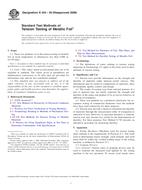We need your consent to use the individual data so that you can see information about your interests, among other things. Click "OK" to give your consent.
ASTM E345-93(2008)
Standard Test Methods of Tension Testing of Metallic Foil
STANDARD published on 1.5.2008
The information about the standard:
Designation standards: ASTM E345-93(2008)
Note: WITHDRAWN
Publication date standards: 1.5.2008
SKU: NS-46504
The number of pages: 5
Approximate weight : 15 g (0.03 lbs)
Country: American technical standard
Category: Technical standards ASTM
Annotation of standard text ASTM E345-93(2008) :
Keywords:
ductility (elongation), metallic foil, specimen measurements (dimensions), specimen preparation, specimen type (A vs. B), speed of testing, strength (ultimate and yield), tension testing, uniaxial tensile stresses, Ductility--metals/alloys, Elongation--metallic materials, Foil, Metallic foil, Strength, Stress--metallic materials, Tensile properties/testing--metallic materials, Yield strength and yield point, ICS Number Code 77.040.10 (Mechanical testing of metals)
Additional information
| Significance and Use | ||||||||||||||||
|
Tension tests provide information on the strength and ductility of materials under uniaxial tensile stresses. This information may be useful in comparisons of materials, alloy development, quality control, and design. The results of tension tests from selected portions of a part or material may not totally represent the strength and ductility of the entire end product of its in-service behavior in different environments. These test methods are considered satisfactory for acceptance testing of commercial shipments since the methods have been used extensively for these purposes. Tension tests provide a means to determine the ductility of materials through the measurement either of elongation or reduction of area. However, as specimen thickness is reduced, tension tests may become less useful for the determination of ductility. For these purposes Test Method E 796 presents an alternative procedure for measuring ductility. |
||||||||||||||||
| 1. Scope | ||||||||||||||||
|
1.1 These test methods cover the tension testing of metallic foil at room temperature in thicknesses less than 0.006 in. (0.150 mm). Note 1—Exception to these methods may be necessary in individual specifications or test methods for a particular material. 1.2 Units—The values stated in inch-pound units are to be regarded as standard. The values given in parentheses are mathematical conversions to SI units that are provided for information only and are not considered standard. 1.3 This standard does not purport to address all of the safety concerns, if any, associated with its use. It is the responsibility of the user of this standard to establish appropriate safety and health practices and determine the applicability of regulatory limitations prior to use. |
||||||||||||||||
| 2. Referenced Documents | ||||||||||||||||
|
We recommend:
Technical standards updating
Do you want to make sure you use only the valid technical standards?
We can offer you a solution which will provide you a monthly overview concerning the updating of standards which you use.
Would you like to know more? Look at this page.




 Cookies
Cookies
